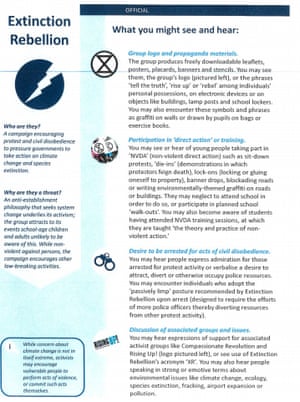e
Terror police list that included Extinction Rebellion was shared across government
Document was sent to several departments, NHS England, Ofsted and 20 councils
Mon 27 Jan 2020 14.13 GMT
 The Extinction Rebellion flag in Marble Arch, London, last year. Photograph: Nick Moore/Alamy Stock Photo
The Extinction Rebellion flag in Marble Arch, London, last year. Photograph: Nick Moore/Alamy Stock Photo
Controversial guidance that listed Extinction Rebellion as an extremist ideology was sent to a wide range of government departments and local authorities including the Home Office and Counter Terrorism Policing headquarters, the Guardian can reveal.
The south-east division of Counter Terrorism Policing was forced to recall the document, which listed the climate crisis group alongside neo-Nazis and jihadists, after it was exposed by the Guardian.
After the Guardian revealed the document’s existence Counter Terrorism Policing South East (CTPSE) branded it an “error of judgment” and said it “was produced at a local level”.
But now, after an internal review, the unit has confirmed the guide was sent to the Home Office, the Department for Education, NHS England, the Ministry of Defence, HM Prison Service, Probation Service and Ofsted, as well as 20 local authorities, five police forces and Counter Terrorism Policing headquarters (CTPHQ) in London.
The guide placed Extinction Rebellion alongside neo-Nazi groups and jihadists and encouraged public sector workers to report any individuals with links to them to Prevent, the controversial anti-radicalisation programme.
The distribution list shows a wide range of organisations across the country were in receipt of it for more than a month before it was recalled and prompted questions over the lack of action taken by CTPHQ, the Home Office and others to flag its contents.
Yvette Cooper, the Labour MP and chair of the home affairs select committee in the last parliament, said: “The Home Office should explain what action they took when they received the CTPSE guidance and also whether they have yet asked other regional counter-terror units to review and share with the Home Office their counter-terror guidance to make sure they aren’t getting it wrong in the same way.
“The Home Office should show some leadership and responsibility on this. It isn’t about an individual investigation, where operational independence is crucial.
“Instead it involves the broader shared responsibility between the Home Office, the police and other agencies on how extremism should be defined, what the scope of counter-terror work should be and maintaining public confidence in the crucially important counter-terror work the police do.”
The document was also sent to unitary authorities and county councils in Milton Keynes, Slough, Bracknell Forest, Reading, Wokingham, West Berkshire, the Royal Borough of Windsor and Maidenhead, Southampton, Portsmouth, the Isle Of Wight, Brighton and Hove, Medway, Buckinghamshire, Oxfordshire, Surrey, Hampshire, East Sussex, West Sussex and Kent.
Police forces for the Thames Valley, Hampshire, Sussex, Surrey and Kent also received the document.
A spokesperson for CTPHQ said: “CTPHQ was included in the wider email distribution list for this document. It was not sent for our review or approval, nor was it forwarded on by the individual that received it to others. As CTPSE has made clear, the document has now been recalled.”
The document was made available internally to NHS England staff but was not used for any specific briefings or training sessions.
It is understood staff working in counter-extremism in the Department for Education received the guide but it was not forwarded outside the department.
Likewise the Home Office did not forward it outside the department. The department did not request the guide, and it was not reviewed, commented on or cleared by the Home Office.
A spokesperson for Extinction Rebellion said: “We need to find out who knew what and when. But more importantly, we need to know why. Why are they trying to silence a peaceful, non-violent movement of people who are trying to make sure the world’s children have a future?”
Last week, the security minister, Brandon Lewis, failed to say when the Home Office had seen the document when an urgent question was granted on the Home Office’s oversight of the police in their operation of the Prevent programme.
When asked by Cooper when the Home Office saw the guidance, Lewis replied: “As I say, the police have withdrawn the document and are reviewing it.
“I fully respect, and the government respect, the independence of the police, and those guidance documents are part of their independence.
“The police produce those documents for their officers in the work that they do, and it is right that we respect that.
“The home secretary and I meet representatives and the leadership of counter-terrorism police and other partners on a weekly basis. We will raise this issue with them, to ensure that they are focused on the importance of getting this right.
“Those documents are about alerting their officers to all the types of groups and symbols that they may deal with in their day-to-day work. We need to acknowledge the regret that the police have shown over this error of judgment, and the fact that they are reviewing the document.”
After the document surfaced, the Guardian was approached by teachers and council workers across the country who had received Prevent training that referenced Extinction Rebellion.
A separate counter-terrorism document, a guide to symbols and logos, featured Greenpeace, Peta and other non-violent groups alongside National Action, Combat 18 and swastikas. It had been listed by schools, NHS Trusts and safeguarding boards as a Prevent resource material. A number of groups have threatened legal action.
City of London police labelled Extinction Rebellion one of its “key threats” in a counter-terrorism assessment and provided awareness training on the climate crisis group across the capital, resulting in “intelligence” tip-offs.
Police chiefs have insisted they do not consider Extinction Rebellion and other non-violent groups to be extremists or terrorists and the documents were intended to help officers distinguish between groups of interest and others.
-------------------------------------------------------
My Comments :
2. They even try - and rather successfully one might conclude - to install governments that are fossil fuel friendly, such as the election of Trump and the GOP seems to gave proven conclusively.
3. Security agencies seem to be increasingly the all too willing auxiliaries of the industry in their struggle to prevent our planet to be saved from destruction.
4. Fighting democracy as such appears to have become the main strategy of the fossil fuel power elite.

Geen opmerkingen:
Een reactie posten
Opmerking: Alleen leden van deze blog kunnen een reactie posten.